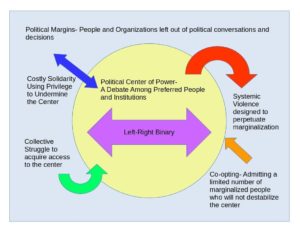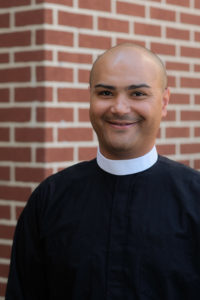Luke 13:31-33 (CEB)
31 At that time, some Pharisees approached Jesus and said, “Go! Get away from here, because Herod wants to kill you.”
32 Jesus said to them, “Go, tell that fox, ‘Look, I’m throwing out demons and healing people today and tomorrow, and on the third day I will complete my work. 33 However, it’s necessary for me to travel today, tomorrow, and the next day because it’s impossible for a prophet to be killed outside of Jerusalem.’
I long for a spirit of love, kindness, and compassion to come upon our national discourse, because ultimately, without loving each other deeply, there can be no genuine movement towards the common good. As a student of American Government and the Constitution in college, I am profoundly aware that everything about our system was designed to slow things down, temper the passions of the day, and make change difficult through a series of interlocking and divided powers. Most of the substantial political and policy change in the United States was made through partisan wave elections where one party swamped the other, through triangulation where divided government meant that executives of one party tried to outflank the opposition by taking over their issues, or through constitutional crises where executives have invented new powers in times of emergency that allowed them to ignore the system of shared powers.

Our two-party system creates the illusion that American political life consists of a simple left-right binary and that this is the defining feature of our political landscape. I’ve included the diagram above to try and pull back to a broader view of our system and to illustrate some convictions that I have about my participation in public life that are grounded in my faith, my queerness, and the experience that I’ve never found binaries to be a particularly convincing narrative.
My first conviction is that political systems include insiders and outsiders, and while these groups aren’t always the same, there tends to be a great deal of stability in this divide. When I think about this theologically, I am reminded that many of the key struggles in the scripture were not against individuals and their personalities, but rather against whole systems (slavery in Egypt, exile in Babylon, persecution by Rome) We live in a system that favors white, heterosexual, married, cisgender, able-bodied, neurotypical, men above all else. In the realm of political diversity, two people who fit this description have far more in common than not, regardless of their place on the binary. What often looks like a grand debate between different parts of the political spectrum is actually an argument inside the center of power. Sometimes this tug of war results in a public good that has an impact on both the center and the margins, for example, the widely popular programs of the Social Security Administration. More often, the outcomes look like the center engaging the margins with apathy, paternalism, or even outright hostility. In this understanding of our system, it’s possible for policy and legislation to be made that is broadly bi-partisan because there is a common understanding in the center about which groups in the margins it is acceptable to harm through government action without losing popular support. Let that sink in for a moment, we live in a system where some people and communities matter so little or not at all, and therefore it is possible to harm them without political repercussions. Which brings me to my second conviction.
It isn’t possible to create a human system of living arrangements without harm. If you’re a fan of the comedy The Good Place, you know that we can never get enough points to become totally good. While this is not an excuse to abandon the pursuit of the common good, to imagine that we can conjure the best outcomes for all people at all times is a beautiful and ultimately fruitless goal. Decisions have consequences, costs, unintended side effects, and in some cases, far-reaching consequences that we are terrible at predicting. Worse yet, we often focus most of our political discourse on intentions and proposals, while often ignoring the outcomes and the impact. We give ourselves over to the sin of staying with policies that are deleterious because they seem right in theory when in reality they are destructive. Controlling the political center means in large part controlling the amount and intensity of violence directed at the margins. Though sometimes the injustice reaches a point of changed consciousness. Conviction number three- people can have their worldview radically changed.
Changed consciousness takes different forms, but the theological framework for this process is conversion or repentance. Suddenly, something cannot go on any longer. It can look like marginalized people banding together, perhaps even with willing collaborators, and telling each other their story of being harmed, recognizing that it must stop, and putting direct public pressure on the center through protest, organizing, social disruption, boycotts, and even property destruction to raise the cost of the ongoing harm. The goal is often to push the center into recognizing that it is too costly to continue the harm. The larger the coalition and the more disruptive it can be to normal patterns of life, the larger the political cost of ignoring it. Sometimes the center is disrupted to the point where people in the center begin to disagree vehemently about whether certain forms of harm are acceptable. This can feel like a failure of the system, but I believe that it is the price paid for the new awareness. People in the center who experience this shift in understanding have a responsibility to be aware of their role in the system, an appreciation of how previous behaviors contributed to communal harm, and a willingness to make changed behavior (as opposed to doubling down, self-negation, or performative pity) one of their primary responses. It helps to be awake, it helps even more to get out of bed. This brings me to my final conviction, the Holy Spirit transforms my consciousness in order to transform my living and I am called to engage the system differently, especially where my identity puts me in the center.
The center has a lot of power to respond to people’s struggle against the harm being done to them. They can scapegoat the group, change the subject, create distractions and even increase the amount and intensity of violence with the hopes that this will break the spirit of the coalition. Sometimes, people in the center will focus on token acts of inclusion and attempt to co-opt the movement by drawing a small selection of people into the center, improving their treatment, and expecting them to become evangelists for the system instead of their own liberation. What’s more painful and deflating than the formerly marginalized minority scolding the unruly nastiness of the people who haven’t made it in yet?
As a follower of Jesus who experiences some marginalization, but also a great deal of centering, I find myself wrestling with the dual temptation of avoiding invitations to be co-opted, and making such invitations myself. Part of what makes Jesus compelling for me is the way he embodies how the center should be- simultaneously aware of power and authority, and ready to face the cost so that his neighbors could know life, liberation, and love. The gift of the Cross is a revelation that God has broken the power of Sin, not the backs of individual sinners. I find myself challenged in my relationship with Christ and in my relationships with people I love to look for chances to practice costly solidarity- using my privilege to help dismantle and curtail the systems that are killing my neighbors and naming my marginalization and experiences of harm to support others who share these experiences. I try to approach voting, public speaking before government officials, letter writing, protest, material support for people in struggle, and even acts of resistance with this conviction firmly in mind. I hope that you find space for costly solidarity in your practice too, the movement for liberation needs collaborators far more than allies. I leave you with this prayer from Fr. Mychal Judge, OFM that we often use to begin our weekly time as street chaplains.
Oh Lord,
Take us where you need me to go.
Have us meet the people you need us to meet.
Tell us what to say.
And please, keep us out of your way.
In Jesus Name, Amen.
 The Rev. JM Longworth, (they/them) OEF lives in Rutland, VT where they serve as the pastor of Good Shepherd Lutheran Church and co-pastor of Faith on Foot. Currently, they serve as dean of the Vermont/New York Conference of the New England Synod and as a member of the Core Team for New England Anti-Racism. They are a life professed member of the Order of Ecumenical Franciscans.
The Rev. JM Longworth, (they/them) OEF lives in Rutland, VT where they serve as the pastor of Good Shepherd Lutheran Church and co-pastor of Faith on Foot. Currently, they serve as dean of the Vermont/New York Conference of the New England Synod and as a member of the Core Team for New England Anti-Racism. They are a life professed member of the Order of Ecumenical Franciscans.



 The Rev. JM Longworth, (they/them) OEF lives in Rutland, VT where they serve as the pastor of Good Shepherd Lutheran Church and co-pastor of Faith on Foot. Currently, they serve as dean of the Vermont/New York Conference of the New England Synod and as a member of the Core Team for New England Anti-Racism. They are a life professed member of the Order of Ecumenical Franciscans.
The Rev. JM Longworth, (they/them) OEF lives in Rutland, VT where they serve as the pastor of Good Shepherd Lutheran Church and co-pastor of Faith on Foot. Currently, they serve as dean of the Vermont/New York Conference of the New England Synod and as a member of the Core Team for New England Anti-Racism. They are a life professed member of the Order of Ecumenical Franciscans. Elle Dowd (she/her/hers) is a bi-furious recent graduate of the Lutheran School of Theology at Chicago and a candidate for ordained ministry in the Evangelical Lutheran Church in America.
Elle Dowd (she/her/hers) is a bi-furious recent graduate of the Lutheran School of Theology at Chicago and a candidate for ordained ministry in the Evangelical Lutheran Church in America.  Lewis Eggleston (he/him/his) is the Associate Director of Development & Communications for ELM. He is a candidate for the Ministry of Word & Service and he resides in Kaiserslautern, Germany with his husband Mitchell and dog-child, Carla.
Lewis Eggleston (he/him/his) is the Associate Director of Development & Communications for ELM. He is a candidate for the Ministry of Word & Service and he resides in Kaiserslautern, Germany with his husband Mitchell and dog-child, Carla. Cary Bass-Deschênes (they/them) has been the lead pastor at Lutheran Church of the Cross in Berkeley, California, since 2015; a small congregation with big works; serving the homeless and food-insecure community of San Francisco’s East Bay with meals and a Food Pantry. They live with their husband, Michael, in their home in Richmond, with their two dogs, Luna and Esby. They have recently published their third short story, “The Chaos Artist” in the graphic novel
Cary Bass-Deschênes (they/them) has been the lead pastor at Lutheran Church of the Cross in Berkeley, California, since 2015; a small congregation with big works; serving the homeless and food-insecure community of San Francisco’s East Bay with meals and a Food Pantry. They live with their husband, Michael, in their home in Richmond, with their two dogs, Luna and Esby. They have recently published their third short story, “The Chaos Artist” in the graphic novel